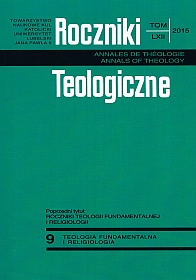Where does the Church Come From? From Liberal Theology to Anton Vögtle
Abstract
The article presents the evolution of the discussion about the origins of the Church from liberal theology to Anton Vögtle. Authors of the “first consensus” of the historical-liberal school (Harnack, Loisy) questioned the presence of any form of organised Church in the life and teaching of Jesus. The “new consensus” of the eschatological New Testament school (Cullmann, Oepke, Beetz) described the Church as God's People of the ultimate times, whose foundations are the life and teaching of earthly Jesus. The ultimate foundation of the Church occurred during Jesus' death and resurrection. It was confirmed by an eschatological gift of pouring of the Holy Spirit on the day of the Pentecost. The success of the “new consensus”, which is also linked to traditional Catholic ecclesiology, was seriously undermined by Bultmann. Later theological writing (Petersen, Vögtle) excludes earthly Jesus (or at least some of His actions) from the formative period of the Church and point to the post-Paschal period. The resurrected Lord, through pouring of the Holy Spirit and cooperation (synergy) with His disciples, establishes and builds up His Church. In this respect the Church is not as much a ready-made establishment but a process (“permanent ecclesiogenesis”). Its origins are found in the relationship between Jesus and the idea of God's Kingdom, His disciples, and in the mystery of His death and Resurrection.
References
Bartynowski S.: Apologetyka podręczna. Obrona podstaw wiary katolickiej z odpowiedziami na zarzuty. Warszawa 19395.
Betz J.: Die Gründung der Kirche durch den historischen Jesus. ThQ 138:1958 s. 152-183.
Bultmann R.: Die Frage nach der Echtheit von Mt 16,17-19. ThBl 20:1941 s. 265-279.
Cullmann O.: Christus und die Zeit. Die Urchristliche Zeit- und Geschichtsauffassung. Zürich 19623.
Cullmann O.: Heil als Geschichte. Heilsgeschichtliche Existenz im Neuen Testament. Tübingen 19672.
Cullmann O.: Königsherrschaft Christi und sie Kirche im Neuen Testament. Zürich 19503.
Cullmann O.: Petrus. Jünger – Apostel – Märtyrer. Das historische und das theologische Petrusproblem. Zürich 1985.
Dola T.: Wiarygodność Kościoła w świetle jego początków. W: H. Seweryniak, M. Skierkowski (red.). Skąd Kościół? Wokół współczesnych pytań opoczątki chrześcijaństwa. Płock 2011 s. 249-265.
Harnack A. von.: Das Wesen des Christentums. Leipzig 1902.
Heinz G.: Das Problem der Kirchenentstehung in der deutschen protestantischen Theologie des 20. Jahrhunderts. Mainz 1974.
Hryniewicz H.: Eklezjologia prawosławna. W: W. Granat. Ku Bogu iczłowiekowi w Chrystusie. Zarys dogmatyki katolickiej. T. 2. Lublin 1974 s.376-391.
Kałuża K.: Schlier Heinrich. W: EK t. 17 kol. 1245-1246.
Kasper W:. Katholische Kirche. Wesen – Wirklichkeit – Sendung. Freiburg im Br. 2011.
Klausnitzer W.: Der Primat des Bischofs von Rom. Entwicklung – Dogma – Ökumenische Zukunft. Freiburg im Br. 2004.
Klausnitzer W.: Kirche, Kirchen und Ökumene. Lehrbuch Fundamentaltheologie für studierende, Religionslehrer und -lehrerinnen. Regensburg 2010.
Kümmel W.G.: Jesus und die Anfänge der Kirche. W: Tenże. Heilsgeschehen und Geschichte. Gesammelte Aufsätze 1933-1964 (MThSt 3). Hrsg. v.E.Grässer. O. Merk, A. Fritz. Marburg 1965 s. 289-309.
Kümmel W.G.: Kirchenbegriff und Geschichtsbewußtsein in der Urgemeinde und bei Jesus. Göttingen 19682.
Lohfink G.: Jesus und die Kirche. W: Handbuch der Fundamentaltheologie. Bd. 3: Traktat Kirche. Hrsg. v. W. Kern, H.J. Pottmeyer, M. Seckler. Paderborn−München−Wien−Zürich 20002 s. 27-64.
Lohfink G.: Jezus z Nazaretu. Czego chciał. Kim był. Tł. E. Pieciul-Karmińska. Poznań 2012.
Mastej J.: Permanentna eklezjogeneza. W: M. Rusecki, K. Kaucha, J. Mastej (red.). Kościół w czasach Jana Pawła II. Lublin 2005 s. 113-125.
Michaelis W.: Täufer, Jesus, Urgemeinde. Die Predigt vom Reiche Gottes vor und nach Pfingsten (NTF II 3), Gütersloh 1928.
Oepke A.: Das neue Gottesvolk in Schrifttum, Schauspiel, bildender Kunst und Weltgestaltung. Gütersloh 1950.
Oepke A.: Der Herrenspruch über die Kirche Mt 16,17-19 in der neuesten Forschung. Ein kritischer Bericht. StTh 2:1949 s. 110-165.
Petersen E.: Die Kirche. W: Tenże. Theologische Traktate. Ausgewählte Schriften 1. Mit einer Einleitung v. B. Nichtweiß. Würzburg 1994.
Pié-Ninot S.: Wprowadzenie do eklezjologii. Tł. T. Kukułka. Kraków 2002.
Schlier H.: Die Zeit der Kirche. Exegetische Aufsätze und Vorträge. Freiburg 19664.
Schlier H.: Kurze Rechenschaft. W: K. Hardt (Hrsg.). Bekenntnis zur katholischen Kirche. Würzburg 1955 s. 165-195.
Seweryniak H.: Tajemnica Jezusa. Warszawa 2001.
Seweryniak H.: Teologia fundamentalna. T. 2. Warszawa 2010.
Trilling W.: „Implicite Ekklesiologie”. Ein Vorschlag zum Thema „Jesus und die Kirche”. W: Tenże. Die Botschaft Jesu. Freiburg im Br. 1978 s.57-72.
Vögtle A.: Das öffentliche Wirken Jesu auf dem Hintergrund der Qumranbewegung (FÜR NF 27). Freiburg 1958.
Vögtle A.: Der Einzelne und die Gemeinschaft in der Stufen folge der Christusoffenbarung. W: Sentire Ecclesiam. FS Hugo Rahner. Hrsg. v. J. Danielou, H. Vorgrimler, Freiburg 1961 s. 50-91.
Vögtle A.: Die hermeneutische Relevanz des geschichtlichen Charakters der Christusoffenbarung. EThL 43:1967 s. 470-487.
Vögtle A.: Ekklesiologische Auftragsworte des Auferstandenen. W: Sacra Pagina. Miscellanea biblica congressus internationalis catholici de re biblica (BEThL 12/13). Bd. 2. Hrsg. v. J. Coppens, A. Descamps, E.Massaux. Paris 1959 s. 280-294.
Vögtle A.: Jesus und die Kirche. W: Begegnung der Christen. Studien evangelischer und katholischer Theologen. FS Otto Karrer. Hrsg. v. M. Roesle, O. Cullmann. Stuttgart 19602 s. 54-81.
Copyright (c) 2015 Roczniki Teologiczne

This work is licensed under a Creative Commons Attribution-NonCommercial-NoDerivatives 4.0 International License.





